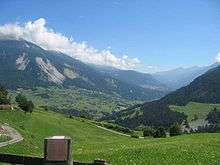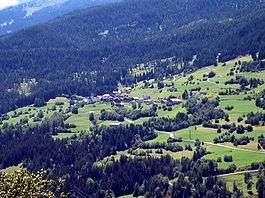Mon, Switzerland
| Mon | ||
|---|---|---|
| Former municipality of Switzerland | ||
|
Mon village from the air | ||
| ||
 Mon | ||
|
Location of Mon  | ||
| Coordinates: 46°38′N 9°33′E / 46.633°N 9.550°ECoordinates: 46°38′N 9°33′E / 46.633°N 9.550°E | ||
| Country | Switzerland | |
| Canton | Graubünden | |
| District | Albula | |
| Area | ||
| • Total | 8.51 km2 (3.29 sq mi) | |
| Elevation | 1,231 m (4,039 ft) | |
| Population (Dec 2013) | ||
| • Total | 90 | |
| • Density | 11/km2 (27/sq mi) | |
| Postal code | 7458 | |
| SFOS number | 3502 | |
| Surrounded by | Riom-Parsonz, Salouf, Stierva, Tiefencastel | |
| Website |
SFSO statistics | |
Mon is a former municipality in the district of Albula in the canton of Graubünden in Switzerland. On 1 January 2015 the former municipalities of Alvaschein, Mon, Stierva, Tiefencastel, Alvaneu, Brienz/Brinzauls and Surava merged to form the new municipality of Albula/Alvra.[1]
History
Mon is first mentioned around 1001-1200 as de Maune. In 1281 it was mentioned as Mans.[2] Until 1943 Mon was known as Mons.[1]
Geography

Before the merger, Mon had a total area of 8.5 km2 (3.3 sq mi).[3] Of this area, 36.7% is used for agricultural purposes, while 58.8% is forested. Of the rest of the land, 1.9% is settled (buildings or roads) and the remainder (2.7%) is non-productive (rivers, glaciers or mountains).[3]
The municipality is located in the Alvaschein sub-district of the Albula district. It is southwest of Tiefencastel on the left hand slope of the Oberhalbstein Range.
Demographics
Mon had a population (as of 2013) of 90.[3] As of 2008, 5.6% of the population was made up of foreign nationals. Over the last 10 years the population has grown at a rate of 7.1%. Most of the population (as of 2000) speaks Rhaeto-Romance (52.3%), with German being second most common (45.3%) and Italian being third ( 1.2%).[3]
As of 2000, the gender distribution of the population was 46.7% male and 53.3% female.[4] The age distribution, as of 2000, in Mon is; 13 people or 15.1% of the population are between 0 to 9 years old. 8 people or 9.3% are 10 to 14, and 1 people or 1.2% are 15 to 19. Of the adult population, 5 people or 5.8% of the population are between 20 to 29 years old. 11 people or 12.8% are 30 to 39, 17 people or 19.8% are 40 to 49, and 9 people or 10.5% are 50 to 59. The senior population distribution is 11 people or 12.8% of the population are between 60 to 69 years old, 9 people or 10.5% are 70 to 79, there are 2 people or 2.3% who are 80 to 89.[5]
In the 2007 federal election the most popular party was the CVP which received 56.1% of the vote. The next three most popular parties were the SPS (24.3%), the SVP (13.8%) and the FDP (5.9%).[3]
In Mon about 79.5% of the population (between age 25-64) have completed either non-mandatory upper secondary education or additional higher education (either university or a Fachhochschule).[3]
Mon has an unemployment rate of 0.66%. As of 2005, there were 19 people employed in the primary economic sector and about 9 businesses involved in this sector. 2 people are employed in the secondary sector and there is 1 business in this sector. 11 people are employed in the tertiary sector, with 4 businesses in this sector.[3]
The historical population is given in the following table:[2][4]
| year | population |
|---|---|
| 1850 | 155 |
| 1900 | 112 |
| 1950 | 105 |
| 1960 | 91 |
| 1970 | 86 |
| 1980 | 66 |
| 1990 | 67 |
| 2000 | 86 |
| 2010 | 97 |
Heritage sites of national significance
The baroque Church of St. Franziskus/S. Francestg is listed as a Swiss heritage sites of national significance.[6] The Capuchin built church dates from 1643-48. The frescoes were finished by Johann Rudolf Sturn, but in 1915 were partially painted over. However, following the renovation in 1975, the original frescoes are once again visible.[2]
References
- 1 2 Amtliches Gemeindeverzeichnis der Schweiz published by the Swiss Federal Statistical Office (German) accessed 2 January 2013
- 1 2 3 Mon in German, French and Italian in the online Historical Dictionary of Switzerland.
- 1 2 3 4 5 6 7 Swiss Federal Statistical Office accessed 15 January 2015
- 1 2 Graubunden in Numbers (German) accessed 21 September 2009
- ↑ Graubunden Population Statistics (German) accessed 21 September 2009
- ↑ Swiss inventory of cultural property of national and regional significance 21.11.2008 version, (German) accessed 25-Sep-2009
External links
- Mon, Switzerland in German, French and Italian in the online Historical Dictionary of Switzerland.
 Media related to Mon, Switzerland at Wikimedia Commons
Media related to Mon, Switzerland at Wikimedia Commons

